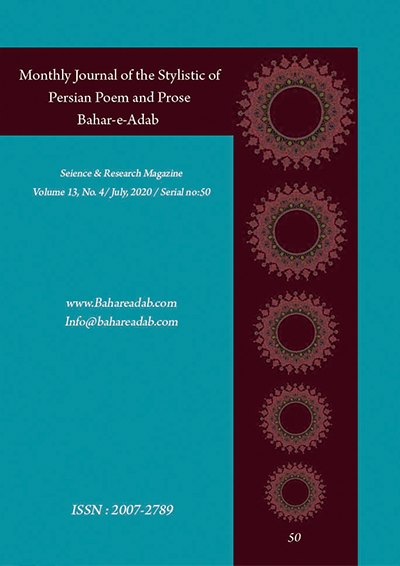- Count View : 741
- آدرس کوتاه شده مقاله: https://bahareadab.com/article_id/368
Journal of the stylistic of Persian poem and prose
volume Number 13،
number In Volume 4،
،
issue Number 50
The intellectual level of poetic return and constitutional poetry style, Case study: The poets' view of the legitimacy of the Qajar government
Fatemeh Saeifi, Abdolhosein Farzad(Author in Charge), Farhad Tahmasbi
Abstract
Persian poetry has never neglected dealing with social and political issues. The poet was rewarded to propagate the king and government"s thoughts or he was believing himself responsible and committed for society and people are different matters. Legitimacy has always been one of the means for their survival, and Persian poetry has not been indifferent to it. In the present essay we have tried to study the process of Iranian belief about legitimacy of king and government in Persian poetry, specially in Poetic Return and Constitutional poetry styles, to show how the poets have used poems to legitimate or illegitimate governments.
Keyword
Legitimacy
, Poetic Return
, Constitutional Poetry
, Legitimate
, Illegitimate
- Arianpour, Yahya (1350), From Saba to Nima, Tehran Pocket Books Company
- Adamit, Fereydoun (1351), The Thought of Progress and the Rule of Law, Tehran Kharazmi
- Shamim, Ali Asghar (1995), Iran during the Qajar Dynasty, Tehran : modaber
- Torabi, Seyed Mohammad (1996), Autumn Leaves (excerpts from Seif Ferghani), Tehran, Sokhan
- Saadi, Mosleh Ibn Abdullah (1980), Bustan, edited by Gholam Hossein Yousefi, Tehran, Association of Persian Language and Literature Teachers
- Kermani, Nazem al-Islam (1978), History of Iranian Awakening, by Saeedi Sirjani, Tehran; Iranian Culture Foundation
- Cohen, Alvin Stanford (2002), Theories of Revolution, translated by Alireza Tayeb, Tehran, Qoms
- Freund, Julien (2004), Max Weber Sociology, translated by Abdolhossein Nikgohar, Tehran, Totia
- Ansari Balkhi, Abolghasem (1342), Divan, by Mohammad Dabirsiyaghi, Tehran, Sanaei
- Bahar, Mohammad Taghi (2001), Poetry Divan, Tehran Toos
- Amir Moazi, Mohammad Ibn Abdolmalek (1318), Divan, by Abbas Iqbal, Tehran, Islamic Bookstore
- Anvari, Ali Ibn Mohammad (1372), Divan, by the efforts of Modarres Razavi, Tehran, Elmi va Farhangi
- Hafez Shirazi, Shamsuddin Mohammad (2011), Divan, by Qassem Ghani and Mohammad Qazvini, Tehran:Zavar
- Dehkhoda, Ali Akbar (1983), Divan Dehkhoda, by Dabirsiyaghi, Tehran, Tirazhe
- Soroush Esfahani, Mirza Mohammad Ali Khan (1940), Soroush Esfahani's Divan, by Mohammad Jafar Mahjoub, Tehran, Amirkabir
- Sheibani, Fathollah Khan (1992), Divan, by Ahmad Karami, Tehran, nashr ma
- Vesal Shirazi, Mirza Mohammad Shafie (1999), Divan, edited by Mahmoud Tavousi, Shiraz, Navid Shiraz
- Qaani, Habibollah Ibn Mohammad Ali (2001), Divan, edited by Amir Hossein Sanei, Tehran, Negah
- Shamisa, Sirus (2009), Poetry Stylistics, Tehran, Mitra
- Dabirsiyaghi, Mohammad (1995), Sokhan Gostar Sistan (excerpt of Sistan poems), Tehran, Sokhan

